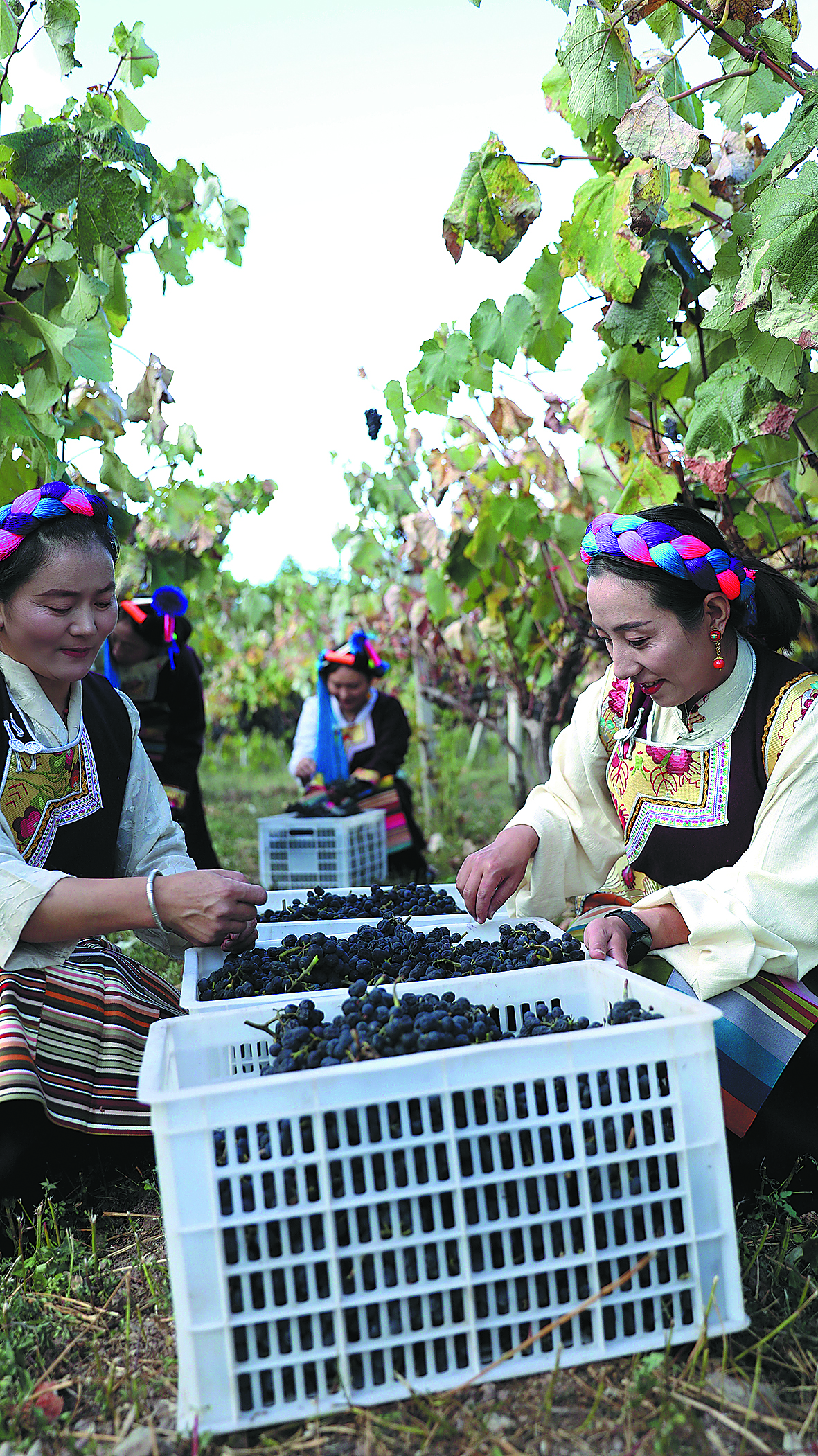New Farmers Embrace Entrepreneurial Spirit
 |
| Choitso (R) picks grapes at a vineyard in Markham, Tibet Autonomous Region. [China Daily] |
It's not difficult to meet a grassroots delegate to the 20th National Congress of the Communist Party of China at the hotel where they are staying this week. After all, 33.6 percent of the 2,296 delegates come from the front line of work and production.
Among these glowing faces who could not help but show their excitement to attend the congress, some are farmers or workers from the agriculture sector.
Though all suited up for the event in the capital, they were still concerned about the cornfields or vineyards at home because usually they were busy with the autumn harvest at this time of year.
When I asked them who they represent, Li Zhonghua, head of an agricultural cooperative in Tieling, Liaoning Province, told me he would rather define himself as a new farmer with advanced technology and production.
New farmers such as Li have become an important force in promoting rural vitalization in recent years. Figures from the Ministry of Agriculture and Rural Affairs show that by the end of 2020, about 10 million people had returned home for rural entrepreneurship and the number is estimated to exceed 15 million by 2025.
With modern techniques, new farmers know how to integrate the strengths of villagers and solve problems in rural areas such as inefficient productivity and weak industry.
When Li saw the highlights on agricultural cooperatives and new farmers from the No 1 Central Document issued in 2012, he returned to Changtu, a major grain-producing county in Tieling, and opened a cooperative to provide farmers with agricultural machinery.
Starting with two high-quality harvesters and four tractors, the cooperative has realized large-scale grain production in the county with comprehensive machinery operations.
Li brought machinery that freed farmers from tedious work and greatly increased productivity. Now, machines from his cooperative are able to sow over 66 hectares and harvest 100 hectares of farmland per day.
With the technical support of the Chinese Academy of Agricultural Sciences, the cooperative has increased corn yields through new planting skills and is working on a conservative farming system that can save resources and protect the environment.
New farmers like Li understand that sustainable grain production has to respect the natural rules and be environmentally friendly.
While some of the new farmers started with traditional farming but learned to upgrade the mode of production with new technology, some younger rural entrepreneurs seem to be more familiar with market rules and are good at branding their agricultural products.
Choitso attracted me with her beautiful eyes that are typical for Tibetan women. The 33-year-old is Party secretary of Zangdong Treasure Wine Company in Markham county, Chamdo.
The wine company was founded by her father but remained a family workshop until her elder brother returned home after attending a "Tibet class" in Tianjin for middle school, which allows Tibetan students to pursue education in inland cities.
Among the first herders to start up businesses in rural areas, her brother was aware of the importance of building a company and a brand to boost the local wine industry.
Choitso herself also joined the family's company after quitting her job as a local public servant. She believed the natural advantages of her hometown in growing grapes can develop a promising industry that involves more local people.
I was impressed by videos posted on Choitso's Douyin, the Chinese version of TikTok. She was harvesting green grapes in the vineyard, introducing Dameiyong wine in ethnic costumes, and dancing and traveling around the beautiful plateau.
She said she was trying to get more young people to understand the industry and, more importantly, come and stay in her hometown to become new farmers.
The number of new farmers sounds like a lot, but there is still a gap based on current needs in rural areas, especially in regions such as Tibet, several delegates in the sector told me.
Loving agriculture and the countryside is a "must" for new farmers. They need to shoulder the responsibility of creating more job opportunities and boosting rural entrepreneurship, ensuring that farmers really benefit from the industry.
Apart from cultivating more new farmers through college education, passing on advanced techniques and ideas to local farmers and hand-by-hand training also work to transform talent in rural vitalization.
(Source: China Daily)
Please understand that womenofchina.cn,a non-profit, information-communication website, cannot reach every writer before using articles and images. For copyright issues, please contact us by emailing: website@womenofchina.cn. The articles published and opinions expressed on this website represent the opinions of writers and are not necessarily shared by womenofchina.cn.






.jpg)

 WeChat
WeChat Weibo
Weibo 京公网安备 11010102004314号
京公网安备 11010102004314号